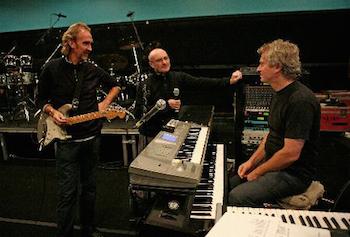 There are no fewer than 11 guiding principles that describe how great music works. “The Essential Secrets of Songwriting”eBook Bundle packages show you each principle, and describe how they’ll make your own songs better. Read more..
There are no fewer than 11 guiding principles that describe how great music works. “The Essential Secrets of Songwriting”eBook Bundle packages show you each principle, and describe how they’ll make your own songs better. Read more..
__________
 I am a big fan of music theory, and believe that songwriters who have a working knowledge of the nuts and bolts of theory will become better writers. So it may seem strange that someone with that point of view would make the claim that in songwriting, rules stifle the imagination. So let’s clear up that apparent contradiction.
I am a big fan of music theory, and believe that songwriters who have a working knowledge of the nuts and bolts of theory will become better writers. So it may seem strange that someone with that point of view would make the claim that in songwriting, rules stifle the imagination. So let’s clear up that apparent contradiction.
Whenever you apply rules to any creative process, you remove the opportunity for your imagination to take you in weird and wonderful directions, and in the creative arts, that’s a problem. A rule tries to say “in this situation, you must next do that. And no songwriter wants to find themselves in that kind of circumstance.
But fortunately that is not what music theory does, and if you find that music theory’s main job is to provide you with a list of rules to follow, you are misunderstanding its importance and primary use.
Rather than telling you what to do, music theory offers an explanation for why things sound the way they do. Theory also offers musicians a vocabulary for communicating musical ideas to others. For example, one guitarist saying to another, “12-bar blues, Bb major, 4/4 time, with a flat-VI in the 10th bar…” is a very concise and accurate way of giving a musical direction that would otherwise take paragraphs. With that one short sentence, you’ve touched on formal design, key, time signatures, and altered chords.
If you do something enough in the world of music, someone will come up with a theory to describe why it works and why it sounds good. But in that sense, music theory is history. It tells you why something that’s already been written sounds good. But it makes no claim that you should continue to write that way.
And in fact, if you continue to write that way, you simply repeat history, and no composer of new music wants to do that, at least not to any great degree.
However, the best music, the songs that really connect with people, are a clever blend of rules (often predictable musical events) and imagination (often unpredictable musical events). And for most good songs, the balance is very much slanted toward predictable.
It’s far better to consider some basic guiding principles of songwriting rather than stiff rules. Rules offer directives and tell you how things must be, but principles merely tell you how things tend to work, offering guidance rather than commands. In this blog, I write almost daily about those principles: for example, that songs tend to be in one key (that’s not a rule); that chorus melodies tend to be higher than verse melodies (not a rule); that song energy increases as a song proceeds (also not a rule).
Most songs have a chorus melody that sits higher in pitch than the verse, but if that were a rule, you’d never hear a song that has a lower chorus melody, as Genesis’ “No Reply At All” does. The observation that chorus melodies are usually higher is a guiding principle.
But that song is in D major, and theory tells us that. All the chords move in and around D major, using the chords of D major, and again, that’s music theory at work. But how those chords are chosen, the rhythms used by the instruments, how long the verse is, the nature of the melodic shapes… those are all products of the imagination, guided by what musicians believed good music should do.
This is why songwriters who spend a good amount of time listening to the music of other songwriters wind up being the best. They hear ideas from other musicians, and then, using their imagination, they modify those ideas to create something unique.
So music theory tells us why things work the way they do in music, and that’s a good thing. But experience and imagination tells us how to take that information and create something new and innovative. Any time you find yourself asking, “In music, am I allowed to…”, it’s time to rethink how you’re using music theory.
______________
 Written by Gary Ewer. Follow on Twitter.
Written by Gary Ewer. Follow on Twitter.
Download “The Essential Secrets of Songwriting” eBook Bundles: High-quality PDF files, readable on desktop, laptop, iPad, iPod, or any other PDF-reading device.










Reblogged this on I Write The Music.
Pingback: ARTICLE LINK: In Songwriting, Rules Stifle the Imagination | Creative Music | Inspiring Musical Creativity